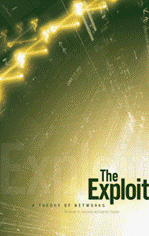Conclusion: Coda
Thacker and Galloway end their book by taking up Hardt and Negri’s concept of the “multitude”: The multitude’s end is to change the “One” or the system as a whole. It does this not by clashing with the One, but by redefining the One (p. 150). An epistemological shift takes place where we may have once identified the One with the State but now identify the One with language (p. 150). Even so, the multitude should not be considered an antithesis to the network. Both empire and the multitude are “distributed networks” that ground their power by dispersing it widely.
Again, however, the question of agency arises as the authors' claim that the power dispersed is not human directed. Instead, like a spreading virus, the power of a network should be understood as the unhuman within the human (p. 154). Like atoms in the body, the unhuman exists elementally in the human body determining our actions while we act back on it (p. 155). What it means to have such a foreign presence in each of us is a shift away from an autonomous individual/node-centered analysis to an edges/relationship mode of investigation.
While the question of agency and the history of racial, ethnic, and class hierarchies are often suspiciously absent throughout the book, The Exploit nevertheless draws our attention to new sites of socio-political transformation. Some of this work is already underway. For example, in Electronic Monuments (2005), Gregory Ulmer rethinks the way we conceive of the tourist network: “Critical tourism allows citizens to participate directly in the continuing invention of ‘America,’ at a time when ‘America’ is part of global symbolic capital” (p. 13). This concept can extend across cultural boundaries, holding the potential for “citizens” of various nationalities, ethnicities, and races to participate in the invention of regional and global networks. Overall, if read in combination with books that stress the cross-cultural component of networks (such as Geert Lovnik’s 2002 Uncanny Networks), The Exploit presents a robust and highly useful account of today’s networked society.
 Review of The Exploit: A Theory of Networks
Review of The Exploit: A Theory of Networks